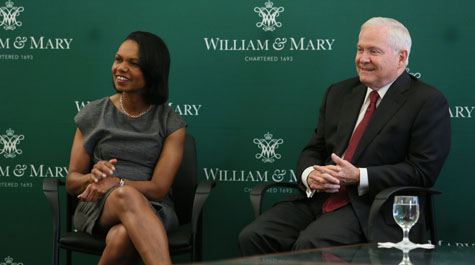"A Time of Consequence": Rice, Gates Reflect on Public Service
About 30 William & Mary student leaders got a peek beyond the headlines – and beyond the official titles – during an intimate chat Friday with Condoleezza Rice and Robert Gates.
Former U.S. Secretary of State Rice the next day delivered the 2015 Commencement address to roughly 10,000 people in William & Mary Hall and was bestowed an honorary Doctor of Public Service degree.
But on Friday afternoon, in the much smaller Blow Hall, she and William & Mary Chancellor and former U.S. Defense Secretary Gates ’65, decades-long friends, spoke candidly with students about all manner of things: the future of higher education, ISIS, relations between civilian and military authorities.
But mostly, they spoke of the people, places and serendipity that led them to careers in public service in, as Rice put it, “a time of consequence.” Because neither of them set out for the Cabinet of the United States.
“You can do all the planning you want about wanting to be in public service,” Rice said. “The best thing you can do is find something you really love to do and say, ‘I’m going to be the best at that.’ If you then are able to meet people who are in public service … they become your mentors. They become your advocates, and they bring you into public service.”
Both of them were headed for academic careers when, during different eras, they were tapped by National Security Advisor Brent Scowcroft – Gates during the Ford administration, Rice during George H.W. Bush’s.
“I wanted to be the best young Soviet specialist in the country, and it was from that perch I met Brent Scowcroft, when he came up to Stanford. When he was asked to be President George H.W. Bush’s national security advisor, he took me as his Soviet specialist,” she recalled. “That's where I met Bob [Gates], who was a deputy national security advisor at the time. It was 1989, and it was the start of the end of the Cold War and being the White House Soviet specialist at that time … it didn't get better than that.”
In Gates’ case, he was first asked by Scowcroft to serve on the National Security Council staff. Later, he transitioned back to the CIA but was approached by Carter’s National Security Advisor Zbigniew Brzezinski to return as his special assistant.
The backstory, he said, was that the Carter administration had cleaned house but quickly realized that there was no one left with experience. An administrative assistant (to whom Gates had been kind) recommended him as someone who could help, so Brzezinski called him. There’s a lesson in that, he said.
“Treat the people you encounter – particularly once you are in government, in public service – with respect and with dignity,” he advised. “You never know who along your path is going to open a door for you that, if you treat them badly, will never open."
Rice said her path to success was initially laid by her parents, who instilled confidence in her despite the realities of segregated Birmingham, Alabama, where they lived. “My parents had me absolutely convinced I could be president of the United States if I wanted to be, even if I couldn’t have a hamburger at Woolworth’s,” she said.
President George H.W. Bush also modeled to her a life of public service. As a young Soviet specialist new to Washington, D.C., he never failed to thank her for her memos and information as the Cold War wound down.
"I want to encourage each and every one of you, try to do public service at some point in your life,” she said. “We spend too much time running down our public servants. We spend too much time assuming that people go into public service because they want to enrich themselves … At some point in your life do something that is really about a greater cause."
Not that that’s easy. Both Rice and Gates talked openly about the difficulties of their careers as well as their transitions out of public life.
“I am a great believer that it is good to be in and out of government, not in it permanently,” Rice said. “I rather feel for people who are sort of hanging around Washington waiting for the next administration and hoping they’ll be in again.”
Gates agreed, saying that transitioning out “is wonderful.” He doesn’t miss the 3 a.m. calls or dreading the day’s news, and he quoted Henry Kissinger: “[High office] consumes intellectual capital; it does not create it.”
“People who cannot let go are missing a link,” he said. “They are missing the self-awareness that they have stopped contributing and are just hanging on.”
“I think it’s hard to fathom how truly exhausting those jobs are,” Rice said. “The compensation for that is you believe you are trying to do your best for the country. We were serving at a time of consequence. After 9/11 and the wars and terrorism, you felt that every day the work you did was truly of consequence. But when it’s over, there is a sense of relief that it’s over.”